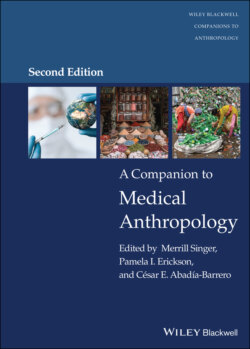Читать книгу A Companion to Medical Anthropology - Группа авторов - Страница 36
INTRODUCTION
ОглавлениеHuman health is biocultural. Indeed, the recognition that human health, illness, and well-being are complexly interwoven biocultural processes, best understood through a variety of humanistic and scientific perspectives, is a foundational tenant of medical anthropology. Thus, it might be expected that biocultural approaches – ones that consider the many imbrications, linkages, and intersections between biology and culture – would be more represented in anthropological approaches to human health. However, while both the biological and cultural underpinnings of health are well recognized, integrative biocultural approaches in medical anthropology are less common, and critical biocultural approaches are relatively new.
Critical biocultural anthropology, the focus of this chapter, falls within a bigger tent of biocultural approaches that encompass a broad range of contributions to medical anthropology, including foci on political economic, psychosocial, and evolutionary processes. Much of biocultural anthropology is an outgrowth of biological anthropology, and not all of these biocultural studies are critical in that they do not attend to social and political-economic processes and relations of power and inequality in their approach (i.e., the critical side of critical biocultural). This review specifically focuses on critical approaches in biocultural medical anthropology, perspectives that foreground power and inequalities, including the power and ideologies in biomedical research and clinical practices, and how inequalities shape conditions on the ground that lead directly to stress, pollution, nutrition, disease, and death.
These various approaches do not abandon ecological frameworks that long dominated biocultural anthropology, rather they attempt to integrate critical and political-economic perspectives with ecological frameworks. The goal of these efforts is not to reduce health and illness to biomedical terms and biological processes and mechanisms, but rather, to fully view human biology and health as inherently social and cultural. The question is not whether health is more biological or more cultural, but how human health processes are always both biological and cultural.
Previous efforts to build such a synthetic bridge have taken several labels, including the “Biology of Poverty” (Thomas 1998), “Critical and Humanistic Biology” (Blakey 1998), “Political Ecology of Biology and Health” (Baer 1996; Leatherman 2005), “Critical Biosocial” (Singer 2011), and “Critical Biocultural Medical Anthropology” (Goodman and Leatherman 1998; Leatherman and Goodman 2011; Singer 1998 ). We use the term “critical biocultural” to locate this work at the intersection of critical medical anthropology and biocultural health studies.
The goal of this chapter is to outline the history and debates leading to a critical biocultural anthropology and then to highlight contributions of a “critical biocultural” approach to medical anthropology. We first outline the emergence of critical biocultural approaches within anthropological studies of health and then discuss their place in medical anthropology and public health. We then review key areas of current research, and potential new directions for critical biocultural approaches. We highlight diverse contributions from biological and medical anthropologists that seek a deeper engagement with the social worlds of their interlocutors.
